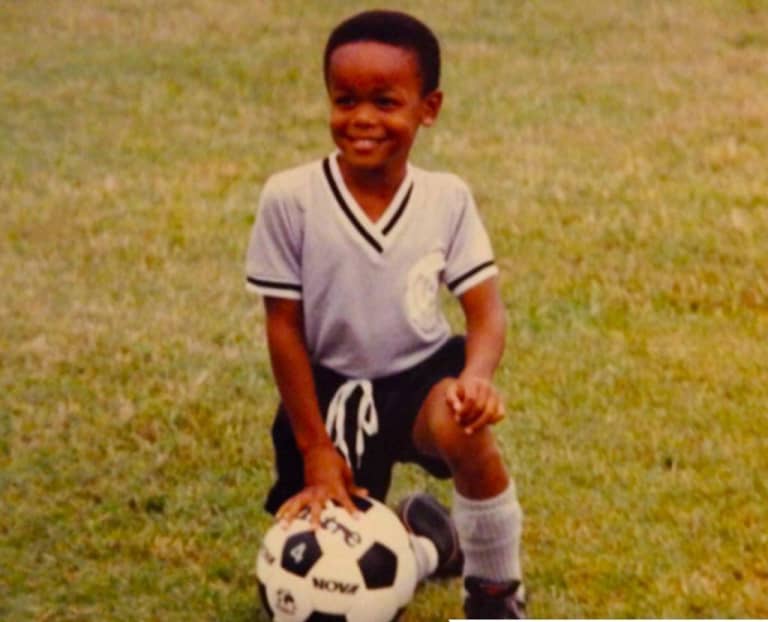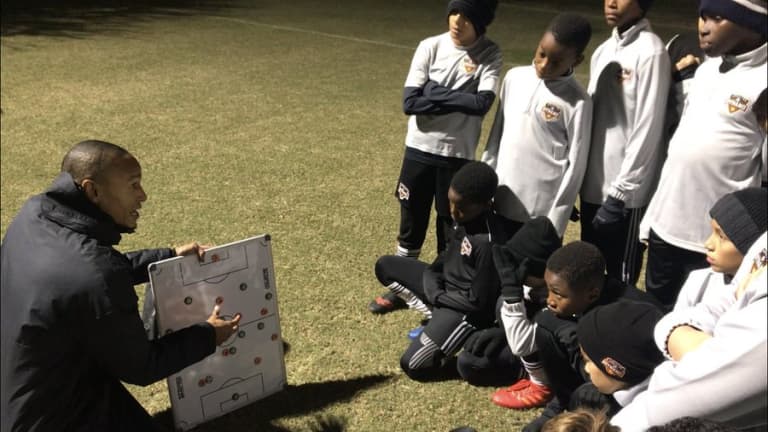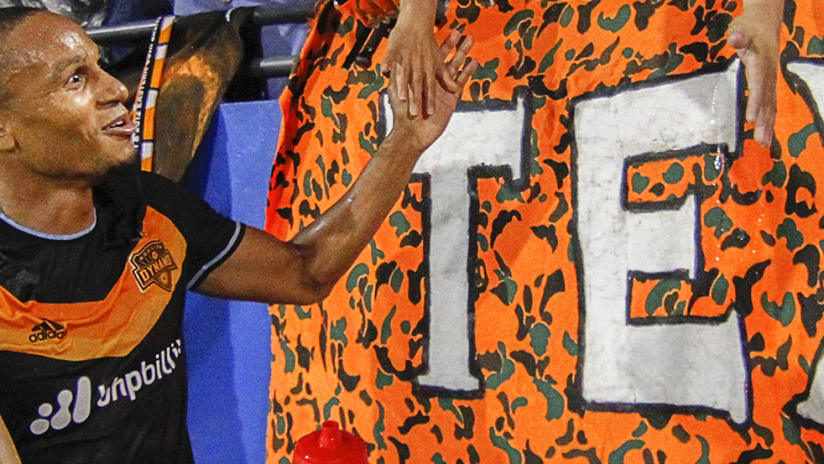Terms like homegrowns, “Play Your Kids” and MLS NEXT hadn’t yet been invented. But Ricardo Clark lived a comparable experience to North America’s current generation of youthful talent when he first hit the MLS scene back in 2003.
A dominant prep star growing up in Jonesboro, Georgia, Clark moved on to become a college standout at Furman University alongside his classmate Clint Dempsey. He actually got the call from MLS even before the Texan, signing a pro contract after his sophomore NCAA season as a member of Project-40, the precursor to the Generation adidas program, and went on to become a tenacious central midfielder for the New York/New Jersey MetroStars, San Jose Earthquakes, Houston Dynamo and Columbus Crew on either side of a European adventure with Eintracht Frankfurt and Stabaek and 34 caps for the US men’s national team.
Now he’s the newest member of the Vancouver Whitecaps’ technical staff, brought on to help nurture the ‘Caps youth movement and hone his new craft under head coach Marc Dos Santos.
“I felt like this was the right time for me to jump on board with the staff here in Vancouver. They have a lot of young talent, and part of my role is to assist in that development of that talent, in regards to individual development and coaching and everything associated with that,” Clark told MLSsoccer.com as he worked through Canada’s quarantine process before joining the ‘Caps preseason in person.
“It was something that was intriguing to me. It was a place where I felt that I could be effective, based on what they needed. And it was something I was passionate about.”
The Whitecaps started last season with the league’s youngest roster and more than half of their current squad is age 23 or younger. Their sprawling network of youth affiliates across Canada fuels an ambitious academy system, the most prominent -- and profitable -- product of which is global sensation Alphonso Davies. Now Clark has arrived to do his part, and carry on the legacy handed down to him over the years by distinguished managers like Bob Bradley, Dominic Kinnear, Christoph Daum and Gregg Berhalter.
It can be said Vancouver’s gain is the Dynamo’s loss. Clark has spent most of the past year since his retirement working with a range of teams and players in the Texas club’s recently revamped youth structure. That helped shape his vision for the next steps in his career.
“Joining up with the Dynamo academy and working with multiple age groups from the U-13s all the way to the U-19s, through all that I found out I relate more to the older players and I relate more to the professional environment,” he explained. “So that's what I gravitated towards. The latter part of my youth coaching experience was geared towards connecting with those young players in that special environment – by doing individual development, whether it be on-field work, video analysis or just conversations on the coaching/mentoring aspect.”
Clark’s ascent to the first-team ranks is also a welcome development for those tracking the ongoing issue of equitable representation on coaching staffs across MLS and the North American game in general.
According to data compiled annually by the Institute for Diversity and Ethics in Sport (TIDES) at the University of Central Florida, Black assistant coaches comprised 8.1% of MLS technical staffs in 2020, compared to 22.4% of the 2020 MLS player pool identifying as such, and a decline from 11.3% in 2019.
While TIDES gave MLS an A+ overall grade for the diversity of its office staff, head coaches, players, and assistant coaches in its most recent “Racial and Gender Report Card,” organizations like Black Players for Change have identified coaching diversity as a high priority as they advocate for greater opportunities at all levels of the game. It’s a topic that has taken on added urgency for Clark since he transitioned from player to coach.
“I noticed the lack of representation on the coaching level as a player, but it’s a little bit more glaring once you make that jump from player to the technical side, especially when you connect with other Black coaches, whether it be at the academy level, first-team level,” he said. “You just see that all the issues in regards to diversity are a little bit more real.

Clark in his youth soccer days | Courtesy of Ricardo Clark
“Diversity is something that breeds success and motivation in my opinion. It brings ideas. It brings a different perspective. It allows people to connect, identify and learn with one other.”
His own journey in the game reflects that. As a 1990s kid in the Atlanta suburbs, Clark and his older brother Richonne, a current NCAA referee, had little in the way of nearby soccer role models to follow, so they had to look further afield -- across both space and time -- for inspiration.
“There wasn’t much soccer on TV, there wasn’t much pro soccer where I grew up. So I would watch tapes of Pele playing,” Clark recalled. “That was a Black player I could identify with. I would watch him on tapes and then go out on the soccer field and the backyard and try to do what he did. Not to say that I'm going to be every Black player’s favorite coach, but I think on a lot of levels … it's really important to increase that representation, to breed connectivity and inclusion, especially with so many Black players, and not to mention fans, in this game. It’s a beautiful thing to see diversity on all levels for the sake of growth. I think all that pays into the success of organizations, in addition to promoting the game in a positive manner.
“It's powerful, it's real, and it's something that's only going to be beneficial to everybody involved.”

Clark during his stint with the Houston Dynamo's academy | Courtesy of Ricardo Clark
While MLS has the Colorado Rapids' Robin Fraser and CF Montreal's Wilfried Nancy among its ranks of current bosses and Cobi Jones helmed the LA Galaxy on an interim basis back in 2010, the league has yet to witness the permanent hiring of a US-born Black head coach in its 26 years of existence. It’s a bit early, and perhaps unfair, to wonder whether Clark can someday make that kind of history.
But he’s on the pathway. Clark is on course to finish his US Soccer A license this summer, a key milestone in his formal coaching education and one of many experiences he can bring to bear as the Whitecaps do their part in the youth renaissance unfolding across the US and Canadian soccer scene.
“It's been great to see how many young players are developing at such young ages and making that jump to high-level competition at such a young age,” he noted of MLS' and respective federations’ efforts to “push the envelope and take things to the next level” in the ongoing search to spot and cultivate the continent’s brightest prospects.
“And with these kids making this jump so early, it’s only pushing the level and pushing the quality of soccer in North America. Hopefully we see the results in games and in individual quality, just the whole package.”














